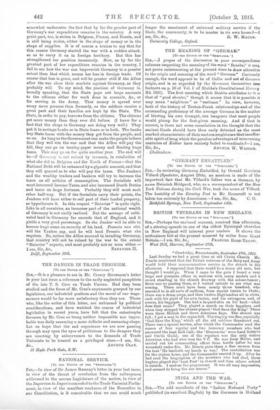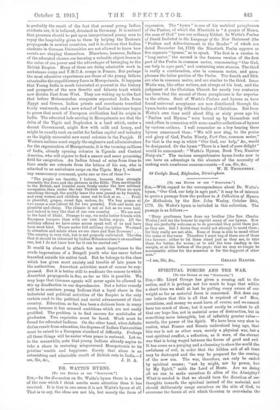INDIA AND THE WAR. [To ME EDITOR OP MI5 "
8PECTATOR."3 Snt,—The odd manifesto of the "Indian National Party" published (in excellent English) by the Germane in Holland is probably the result of the fact that several young Indian students are, it is believed, detained in Germany. It is natural that pressure should be put upon inexperienced young men to repay the hospitality given to them by helping the Teutonic propagansla in neutral countries, and it is obvious that Indian students in German Universities are not allowed to know how events are shaping themselves. Elsewhere, however, Indians of the educated classes are learning a valuable object-lesson in the value of sea power and the advantages of belonging to the British Empire. Many of them are doing admirable work in ambulance corps and Y.M.C.A. camps in France. But perhaps the most educative experiences are those of the young fellows attached to the expeditionary force in Mesopotamia. It happens that Young India is much interested at present in the history and prospects of the now Semitic and Islamic tract which now divides East from West. They are waking up to the fact that before Mohammedan conquests separated India from Egypt and Greece, Indian priests and merchants travelled freely westwards, and a new school of Indian historians hopes to prove that much of European civilization bad its origin in India. The educated lads serving in Mesopotamia see that the delta of the Tigris and Euphrates is a land which, under a decent Government, might flow with milk and honey, and might be exactly such an outlet for Indian capital and industry as the highly successful new canal colonies in the Punjab. If Western nations must supply the engineers and administrators for the regeneration of Mesopotamia, it is the teeming millions of India, already opening colonies in Uganda and Central America, who will rejoice to find a nearer and more promising field for emigration. An Indian friend of mine from time to time sends me extracts from the letters of his son, who is attached to an ambulance corps on the Tigris, May I, without any unnecessary comment, quote one or two of these P— "The people are Semitic, I believe, because they strongly resemble the Jews and the pictures in the Bible. They are friendly to the British, and breathe more freely under the new military occupation than 'under the late Turkish regime. When we were marching through the muddy lanes the men passed us by frankly, and even women and children came out to look at us. . , . Fruit is plentiful, grapes, sweet figs, melons, (tc. We buy grapes at two annas a seer [about ad. for two pounds]. Fish and meat are plentiful and cheap. The climate is not so hot as we were told, and indeed is very like that of our own country. . . We are now in the 'land of khaki. Strange to say, we make bettor friends with European troopers than with our own Indian sepoys. All the military officers we have come across speak well of us and have been most kind. We are under full military discipline. We stand to attention and salute when we see stars and Sam Brownest . . . The country is very rich, but is not properly cultivated. The idea that it should be colonized by Indian Mohammedans is an excellent one, but I do not know how far it can be carried out."
It would be absurd to attach too mueh importance to the crude impressions of a Bengali youth who has never before travelled outside his native land. But he belongs to the class which has given most anxiety and trouble of late years to the authorities. Anarchist activities must of course be sup- pressed. But it is better still to eradicate the causes to which Anarchist propaganda is due, so far as this is possible. We may hope that German agents will never again be allowed to stir up disaffection in our dependencies. But a better remedy will be to convince young Indians that a loyal share in the industrial and political activities of the Empire is the only certain road to the political and social advancement of their country. Education, so far, has been a dubious boon in many cases, because it has aroused ambitions which are not easily gratified. The problem is to find camera for multitudes of graduates. Two requisites must be faced. Work must be found for educated Indians. On the other hand, when definite duties result from education, the degrees of Indian Universities must be raised to a European standard of difficulty. Perhaps all these things will be easier when peace is restored. Let us, in the meanwhile, note that young Indians already aspire to take a share in restoring misgoverned Mesopotamia to its pristine' wealth and happiness. Surely that alone is an astonishing and admirable result of British rule in India.—I















































 Previous page
Previous page